As I explained the importance of withholding final judgment as we gather evidence and information, I saw a crooked grin creep onto his face. “I see what you’re doing,” he said, nodding as he prepared to walk out of class.
When I prepare lessons for my students at Pathways in Technology Early College High School (P-TECH), I always put myself in the student’s place. Why should I care about this lesson? What in it appeals to my life? Is there anything here that will interest a student without a natural curiosity for history? Most importantly, I try to make history relevant for as many students as possible.
Recently, I taught a lesson on Isaac Newton in global studies, as part of a unit on the scientific revolution. Known for discovering gravity and his three laws of motion, Newton also owns one of education’s most-quoted aphorisms: “If I have seen further, it is by standing on the shoulders of Giants.” Originally penned in a letter to contemporary and sometime rival Robert Hooke, this quote is often used to illustrate the Age of Reason’s humility and reverence for their Greek and Roman predecessors. In the past, another social studies teacher at my school used the quote to introduce projects connecting discoveries and achievements during this period to modern technology.
I asked students to describe Newton’s character, based on the quotation. By and large, they produced good, “correct” answers: it shows him to be humble, respectful, serious, and the like. But, I asked, how would your interpretation change if I had told you that Newton was writing to someone he did not like? The responses shifted: maybe Newton was bragging; maybe he wanted to rub his discovery in Hooke’s face; perhaps, there was a point being made about intelligence and access to sophisticated mathematics. As it happened, Hooke and Newton often disagreed publicly, and the letter in which this quote appeared featured some polite debate over the two scientists’ theories of light. Previously, Hooke had requested acknowledgment in Newton’s best-known work, Principia, claiming partial credit for the calculations behind the theory of gravity. In the end, Hooke’s name was entirely removed from the text.
In a letter to a friend after the book’s publication, Newton explained that he had edited one section that, in an early draft, gave some credit to Hooke, “to avoid being baited by little Smatterers in Mathematicks.” Students were again asked to analyze Newton’s comments with the additional context. They worked independently to gather details about the two scientists; though lesser known, Hooke made several meaningful discoveries and contributions to science during his lifetime. In each of my three classes where I taught this lesson, at least one student came back with a critical detail about Hooke: he was short. How would a man short in stature receive a pointed comment about giants?
We decided to use this wrinkle to spur additional thinking. I posted a statement on the board—Isaac Newton reflects the values of the Age of Reason—as our Question Focus. Students brainstormed questions in small groups, reflecting changing ideas about Newton, Hooke, the Scientific Revolution and many other topics. My favorite part of using the Question Formulation Technique (QFT) is watching students’ thinking expand to touch on seemingly disparate topics. Was Newton a jerk? Did Hooke notice or respond to the apparent insult? And my personal favorite, “did they have beef?”
When students have the opportunity to formulate their own questions, their learning often proceeds in new and unexpected directions. Adopting this approach requires teachers to release control, allowing differentiation to occur naturally as a result of students’ ideas. In some ways, it makes my job as a new teacher harder than it has to be. In other ways, putting students in the driver’s seat gives me a unique vantage point from which to observe their thinking and learning. More importantly, forming—and later answering—their own questions makes students think metacognitively about their own learning. How can I support my conclusions? What evidence is ultimately persuasive on a controversial topic? For much of history, clear answers are lacking, so students must get comfortable making determinations on the basis of evidence they gather themselves.
While covering the official curriculum is important, I find greater value in conveying skills and habits of mind to students. Although I have been critical of the teacher evaluation system imposed in New York, these questioning skills are a major emphasis of Charlotte Danielson’s framework. In addition to learning facts and figures, students in my class are asked to think like historians and other social scientists, both posing and investigating questions that they generate. After the initial lesson, one precocious young man approached me with slanted eyes, glaring slightly. “Hey Mister, why did you lie to us?” he asked, catching me unprepared. Did I lie, I wondered?
“I don’t believe that I did lie to you…what do you mean?” I responded.
“You said Newton was polite and reverent and humble, but that’s not true at all…he was a good scientist, but I think he’s kind of a jerk. I mean, why would he make fun of that other guy’s height?”
I reminded him that I never told him anything about Newton beyond his scientific achievements. In truth, he was one of the students most eager to reward Newton for his observed humility when we first looked at the quotation. As I explained the importance of withholding final judgment as we gather evidence and information, I saw a crooked grin creep onto his face. “I see what you’re doing,” he said, nodding as he prepared to walk out of class. Imagine a classroom where all students have this kind of opportunity—to see the world from an entirely new point of view, actually doing the work of academic disciplines.
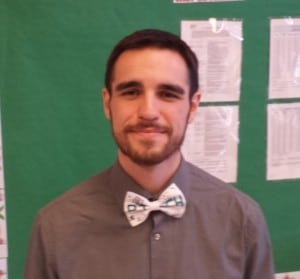 Will Ehrenfeld is a first-year social studies teacher and co-founder of Pathways in Technology Early College High School (P-TECH), located in Brooklyn, New York. He was a research assistant at the Right Question Institute from 2009-2010, while completing a bachelor’s degree in peace & justice studies and political science at Tufts University. Master of Arts in Teaching degree in progress at Empire State College (expected August 2014). Twitter: @willehrenfeld
Will Ehrenfeld is a first-year social studies teacher and co-founder of Pathways in Technology Early College High School (P-TECH), located in Brooklyn, New York. He was a research assistant at the Right Question Institute from 2009-2010, while completing a bachelor’s degree in peace & justice studies and political science at Tufts University. Master of Arts in Teaching degree in progress at Empire State College (expected August 2014). Twitter: @willehrenfeld
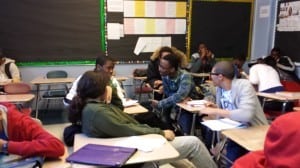
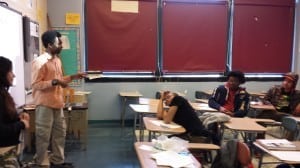
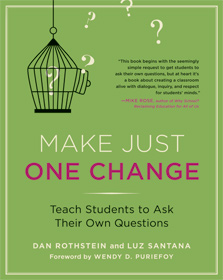
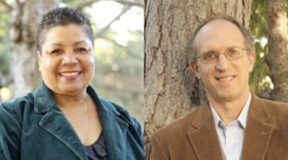

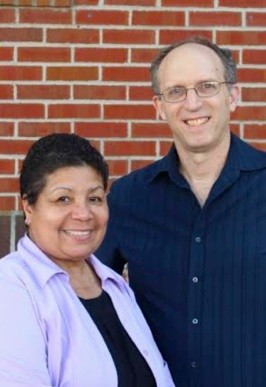
Thank you so much for including the story of your conversation with your student who was initially attached to Newton’s humility. What an important learning moment, orchestrated so gently and artfully by your “I-statement” response to his accusatory question. Everyone’s self-respect and general engagement was allowed to stay intact.
You also helped me with something I asked in an above forum post; I’ll say something about that there.
Thanks so much for this blog post, Will!
JSS
Oops! Thanks so much for this blog post, Jay!
JSS
Thanks for the comment Joan – and it’s mine (Will’s), I promise! I’ve spent a lot of time and effort refining my tone for those student comments; for me, respect is everything and it’s big for me to show students how much I value their thoughts and ideas, even when they’re “wrong” in a conventional sense.
You are clearly not only an extremely deep teacher, but the kind of teacher we need right now in this day of Common Core standards, where people want to either throw them out, teach to the test, tear their hair out, or just put their head in the sand. You can teach to the expected curriculum, help students find out what it is in that curriculum that interests them, own that study, and make deep connections between content, self and history. And this is done through QFT. This post truly inspires.
Thanks Macky! I was lucky to have great experiences before trying my hand at teaching–working with Dan and Luz especially–that gave me a good sense of what is important in education. There are a lot of distractions out there right now in the world of education, but I find that relationships with my students help me to block out some of the “reform” noise.
What an excellent way to teach the value of differences in perspective.